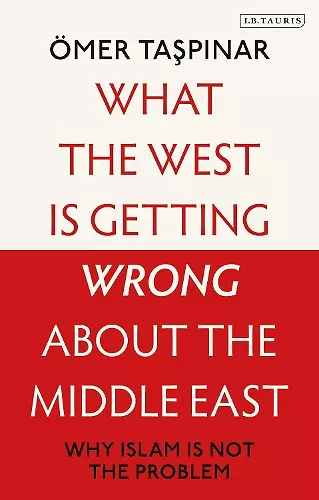What the West is Getting Wrong about the Middle East
Why Islam is Not the Problem
Format:Paperback
Publisher:Bloomsbury Publishing PLC
Published:12th Dec '24
Should be back in stock very soon

Shows that the West overstates the role of Islam in explaining the challenges and problems of the Middle East
The West’s actions in the Middle East are based on a fundamental misunderstanding: political Islam is repeatedly assumed to be the main cause of conflict and unrest in the region. The idea that we can decipher Jihadist radicalization or problems in the Middle East simply by reading the Qur’an has now become symptomatic of our age. This dangerous over-simplification and the West’s obsession with Islam dominates media and policy analysis, ultimately skewing intervention and preventing long-term solutions and stability in the region.
Ömer Taspinar, who has 20 years’ research and policymaking experience, explains here what is really going on in the Middle East. The book is based on three of the most pressing cases currently under the spotlight: the role of Erdogan and the unrest in Turkey; the sectarian clashes in Iraq, Syria, Yemen and Lebanon; and the existence of the so-called Islamic State. Islam is often seen as the root cause of the challenge associated with these cases. But by unpacking the real issues, such as entrenched authoritarianism, vast energy resources, excessive defense spending, and the youth bulge, the book demystifies what is happening and cites governance and nationalism as the main drivers of conflict. The book shows the importance of treating the causes – which are economic, social and institutional – rather than the symptom – the continued and growing success of Islamist parties and jihadist movements in assessing the Middle East. In revealing exactly how Islamism is activated and by analyzing the structural challenges of the region, this unique insider’s account provides a map to understanding Middle Eastern wars and conflicts and the prospects for the future.
To illustrate his contention that the role of Islam is often exaggerated [Ömer Taspinar] offers three diverse case studies: the modern history of Turkey, the sectarian conflict between Sunnis and Shiites, and ISIS. Each of the chapters on these three subjects is worth reading in its own right. * Asian Affairs, Journal of the Royal Society for Asian Affairs *
Prof. Taspinar has produced a worthy addition to what should be a growing body of work on the issue in question. * The Muslim World Book Review *
The Middle East remains at once a concern and an enigma for many in the West. Its problems have been readily blamed on Islam, all the more so as extremist groups have targeted Western interests. In this highly readable and well-argued book Omer Taspinar lays bare the fundamental truth about the Middle East, that its problems and threats have their origins not in religion but in politics. This book is an important corrective for policy-makers and all those interested in the Middle East. -- Vali Nasr, Professor Middle East Affairs, School of Advanced International Studies, Johns Hopkins University; author of The Dispensable Nation: American Foreign Policy in Retreat
This book shines a beacon of reason into the dark night of American ignorance about the Middle East. It methodically undermines the reflexive view that Islam is the inspirational source of upheaval there. By examining the development of Turkey, Iran, Saudi Arabia and groups like ISIS, Taspinar uncovers other forces that more decisively shape Middle Eastern politics. -- Stephen Kinzer, author of "All the Shah's Men" and "Reset: Iran, Turkey and America's Future"; Senior Fellow at the Watson Institute for International and Public Affairs, Brown University, U.S
This is quite simply the best book - and most accessible - on the topic. It is a "must read" for policymakers, scholars and students and an interested general public. Omer Taspinar's incisive analysis effectively critiques a conventional wisdom informed by Western foreign policies, identifying Islam and Islamic civilization as the primary driver in understanding developments in Turkey, the Sunni-Shiah conflict and ISIS, therefore overlooking their specific political, socioeconomic, and cultural contexts. -- John L. Esposito, University Professor and Professor of Religion & International Affairs, the Walsh School of Foreign Service, Georgetown University, Washington D.C.
Certainly Islam played an important role in Middle East Politics, but it never superseded the other factors of "real politics" and has become a spent political force at the start of the 21st century. Debunking this "overislamization" of Middle East politics from concrete examples is one of the great achievements of Taspinar's book. May it be read! -- Olivier Roy, Professor, Robert Schuman Centre for Advanced Studies, European University Institute, Italy
While most scholars and pundits want to mystify the Middle East, wrapping it within religious and cultural enigmas that date back centuries and are of such profundity that western minds can never really grasp the intrigues, Taspinar wants to simplify. In this elegant and cogent tome, he argues that most politics and geopolitics there are in fact about power, money, pride, and survival—just like the ancient times in Greece that Thucydides described, indeed just like almost anywhere else in almost any other era. Taspinar is convincing when he writes about today’s Middle East that ‘Religion is part of the political equation, but more as a driver and instigator rather than the real source of conflicts.’ -- Michael O'Hanlon, Senior Fellow, The Brookings Institution, USA
ISBN: 9780755655069
Dimensions: 216mm x 138mm x 24mm
Weight: 380g
280 pages